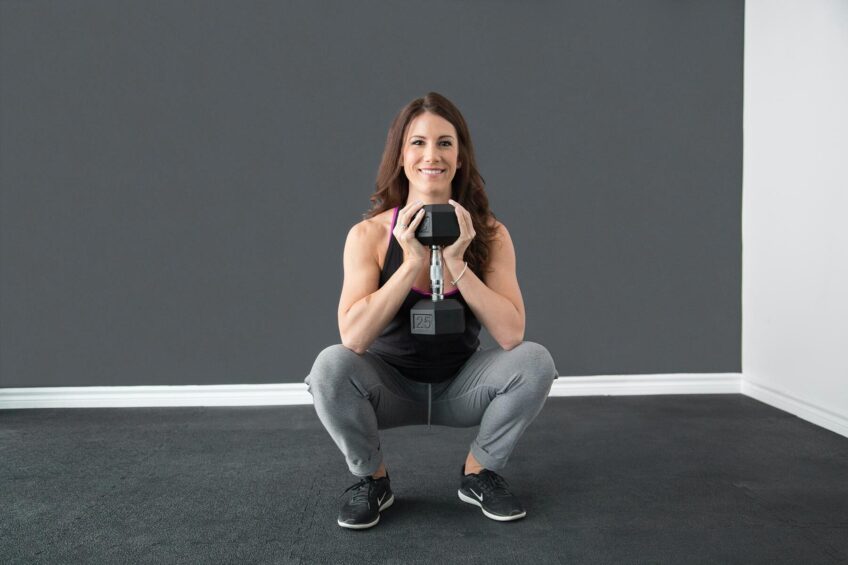Is Strength Training Good for Weight-Loss?
Strength training has many benefits, such as building muscle, but can this form of exercise help you lose weight?

With an obesity rate of nearly 40% in America, it's no surprise that nearly half of all American adults are trying to lose weight.
Carrying excess weight is linked to many health conditions (including heart disease and diabetes), but more than that, it can significantly impact your self-esteem and quality of life.
Science-based recommendations for weight loss include exercise and a healthy whole-food diet (as well as decreased consumption of food high in sugar, saturated fats, and refined carbs). That makes a lot of sense, and I'm always a huge proponent of moderation.
I try to exercise regularly and eat healthy food, but I'm not too concerned about measuring the quantities of either (and I'm a big fan of cheat meals, just not too often.) I'm more focused on feeling strong, fit, and well, rather than being dictated to by my bathroom scale.
But I'm not going to lie. There are definitely times (hello, Christmas!) when I do need to get a bit more focused to shed those pesky pounds. So, what's the best way to do this?
If half of us are trying to lose weight, it makes sense to find the most effective way to get the job done. I'd always thought that aerobic exercise was the best way to create a calorie deficit (where your body is using more calories than you're taking in) and lose weight. So, in the past, I'd up my running distance and hoped for the best.
But, while aerobic activity is good, there's a lot of evidence to suggest that strength training might be better (and if you can combine aerobic exercise, strength training, and healthy eating, you've struck gold.) Let's start with the facts…
How does strength training help with weight loss?
Strength training is going to help you lose weight because:
It Burns Calories
Strength training builds muscle, and muscle is more effective at burning calories than fat. In other words, the more muscle you have, the more calories you'll be able to burn (and that's without the BMR benefits that we'll get to shortly).
Regular resistance training also impacts your ability to keep weight off, with one study finding that under an hour and a half of resistance training was enough to keep people from gaining back weight.
It Makes You Stronger
Strength training is often called resistance training, but I like to think of it as resilience training -- it's going to build your physical strength far beyond just losing fat (but it's going to have a huge impact on your ability to lose weight).

Resistance training will improve your posture, protect you against injuries, boost your endurance, and build full-body strength while protecting your body against the effects of age-related loss of strength. This will keep you exercising without injury so you can benefit from continued weight loss (and just wait until you get hooked on the feeling of being fit and healthy!)
I can do all things through him who strengthens me. Philippians 4:13
A quick note here: strength training isn't going to turn you into a bodybuilder. You can't gain bulk from doing weights unless you're eating more and training with heavy weights. The strength training we're discussing is doing more reps using lighter weights and creating a calorie deficit.
It Builds Lean Muscle
If your workouts are dominated by cardio, you'll lose both muscle and fat. So aerobic exercise needs to be balanced with resistance (strength) training to balance it out. Otherwise, you're at risk of slowing down your metabolism as your body loses lean muscle mass. This is because lifting weights means that the muscles of your body have to adapt to increase their capacity, which increases muscle mass over time and will also result in weight loss. So, if you're not doing strength training, you will not see the same results on the scale (or in how your clothes fit).
It Raises Your Base Metabolic Rate
As you stick with a strength training routine, you'll start building lean muscle, which means you will burn more calories even when you're not exercising. This is all thanks to your base metabolic rate (BMR). Your BMR is the amount of energy your body uses when at rest, and it will be higher if your body is maintaining muscle rather than fat.
So, the more muscle you have, the more calories you're going to burn, even when you're not exercising. And this means that you're also increasing your calorie consumption, making it easier to maintain a calorie deficit, which is the key to weight loss. Weight training can boost your metabolic rate, and you're still going to be burning calories for up to 48 hours after you finish your session.
Unfortunately, you'll notice the results more in how your clothes fit and not as much on the scale because you're building muscle simultaneously as you're losing fat (and muscle is heavier than fat).
Is strength training alone enough for weight loss?

There's always a catch, and this is it: to lose weight, even if you're strength training, you need to burn more calories than you consume (creating a calorie deficit).
Weight training (along with just about any type of exercise) will help with fat loss, provided that you're creating a calorie deficit. And strength training is more effective than cardio, as aerobic exercise can cause you to lose muscle mass.
So, to get the best weight loss results, you're going to need to keep an eye on the calories you're consuming and design your workouts to include both strength training and cardio. But the good news is that strength training is actually going to benefit your aerobic exercise by making you stronger.
To get the biggest bang for your buck, you'll also want to increase your daily activity (monitoring your step count is a good place to start), reduce how much processed food you're eating, and ensure that you're getting enough sleep.
How should you strength-train to get the best weight-loss benefits?
Based on my own experience and what experts have to say on the subject, you're going to get the best weight loss benefits through strength training if you:
Start Slow
You don't want to injure yourself and end up quitting before you've even started to see the results. Focus on increasing the number of reps you do, and rather use lighter weights and build up as your strength increases.
Change up Your Routine
Keep adding in different exercises so that you're using different muscles and burning more calories. If you usually start with cardio, try weight training to get your heart rate up, then continue with your cardio.
Use Your Body Weight
Focus on getting your form right. These exercises will help you burn fat without the need for expensive equipment:
- Lunges (stationary and walking)
- Push-ups
- Planking
- Step-ups (with variations)
- Floor bridge
Get your frequency right
Two strength-training sessions per week are going to give similar gains to three sessions, so save yourself the extra pain. Just make sure you're working on all the major muscle groups (upper body, lower body, and abs).
Conclusion
If you're looking for a quick-fix solution, this isn't it. Strength training is going to make a big difference to your weight, but it's not going to be fast, and it's going to be impacted by:
- Your diet
- Your lifestyle
- Your exercise plan
I think it's important to clarify that weight loss is not a helpful goal for everyone, particularly if you have a history of disordered eating. But, even if you don't, it's important to have realistic expectations and to pursue your weight loss goals that are consistent with your lifestyle and will set you up for long-term success.
There's no point in shedding excess weight, only picking it up a few months later. Instead, focus on making more minor lifestyle changes that you can stick to, even on those days when you'd rather not.
Also, remember that exercise is only one half of the story. You still have to create a calorie deficit which means being mindful of what you eat.
And if you want to enjoy the best results, you will have to team up strength training with cardio, focus on sleeping at least 7 hours a night, and reduce stress in your life.
For me, this has meant a yoga or Pilates class once a week (twice a week would be ideal, but it's not realistic at the moment) and 3 x 35-minute jogs every week. A strength yoga or Pilates class gives me enough strength training, and I’m balancing it with aerobic exercise. This is sustainable (I've been going for over a year now) and enjoyable.
My exercise fits into my busy lifestyle, so I can consistently meet my goals. It has also had positive spill-over benefits into the rest of my life as feeling healthier, trimmer, and more energized has meant that I snack on unhealthy food less and try to restrict myself to one cheat meal a week. I'm also better about getting to bed on time, as an early morning run is much easier on the back of a good night's sleep. My recommendations are to:
- Listen to your body rather than focusing on what the scale says,
- Work on finding a balance between exercise, work, play, and sleep so that you can enjoy your life, and
- Focus on making healthy choices consistently that will continue to pay dividends for many years to come.
You can do it! You can find the strength to persevere!
Jessie Clayton
Jessie Clayton is a highly regarded yoga instructor (RYT 500) and certified nutritionist dedicated to guiding individuals on their journey to holistic well-being, with over 5 years of experience in yoga and nutrition. Jessie is an avid Christ follower and passionate advocate for the harmonious integration of mind, body, and spirit.














